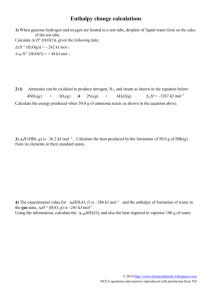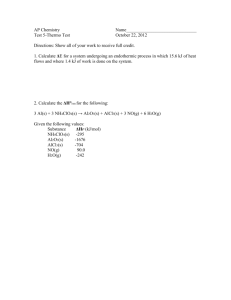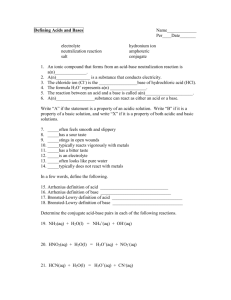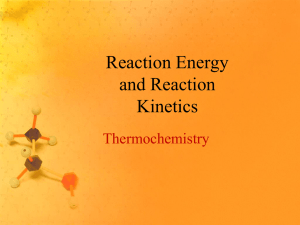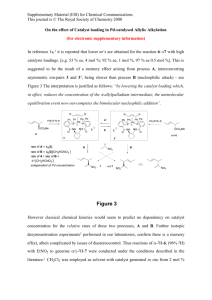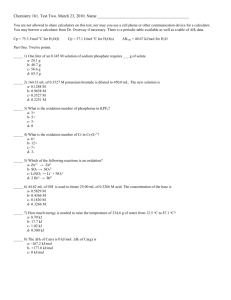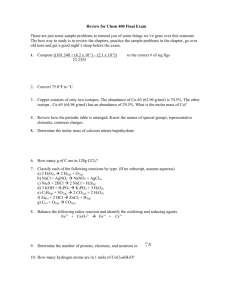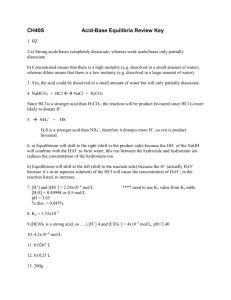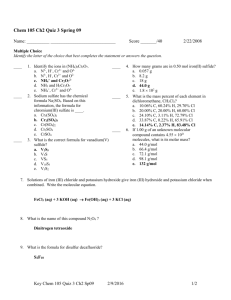Equilibrium Review booklet
advertisement
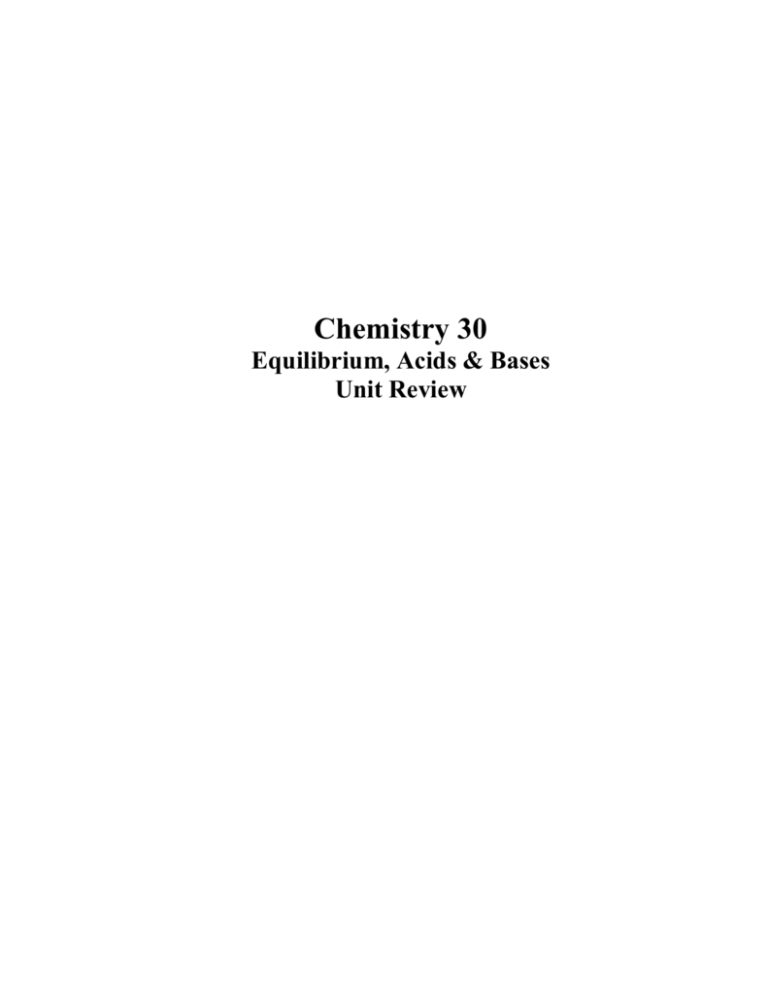
Chemistry 30 Equilibrium, Acids & Bases Unit Review Use the following information to answer the next four questions. Prairie Chem Inc. in Edmonton is a bulk manufacturer of concentrated bleach (NaOCl(aq)). The bleach reacts with water to form a solution with a pH of 10.87. OCl-(aq) + H2O(l) ⇌ HOCl(aq) + OH-(aq) 1. In this reaction, the substances that act as Brønsted-Lowry acids are A. OCl-(aq) and H2O(l) B. OCl-(aq) and HOCl(aq) C. OCl-(aq) and OH-(aq) D. H2O(l) and HOCl(aq) 2. The substance in the equation above that may act as an amphiprotic species is A. OCl-(aq) B. H2O(l) C. HOCl(aq) D. OH-(aq) 3. The two species in equimolar amounts that could act as a buffer in this bleach solution are A. OCl-(aq) and HOCl(aq) B. HOCl(aq) and OH-(aq) C. OCl-(aq) and H2O(l) D. H2O(l) and OH-(aq) 4. In this bleach solution, the acid-base indicator A. phenolphthalein would be colourless B. alizarin yellow R would be orange C. indigo carmine would be green D. methyl orange would be red Chem 30 EAB Review 1 J. Agnew, S. Clayton Use the following information to answer the next question. A source of hydrogen for the Haber process is “syngas”, which is produced by a reaction of methane and water at 1 000C. nickel catalyst CH4(g) + H2O(g) ⇌ CO(g) + 3 H2(g) Numerical Response 1. If, at equilibrium, the [CH4(g)] = 2.97 mol/L, [H2O(g)] = 7.94 mol/L, [CO(g)] = 5.45 mol/L, and [H2(g)] = 2.10 mol/L, then the Keq is __________. (Record your three-digit answer in the numerical-response section on the answer sheet) Use the following information to answer the next question. Some of the SO2(g) produced from the burning of coal and natural gas can react with NO2(g) in the atmosphere according to the equation SO2(g) + NO2(g) ⇌ NO(g) + SO3(g) ΔH = 41.9 kJ 5. The equilibrium concentration of SO3(g) in the reaction could be increased by A. raising the temperature B. adding a catalyst C. removing SO2(g) D. adding NO2(g) 6. Which of the following acid solutions has the lowest pH? A. 300 mL of 1.00 × 10-2 mol/L H2S(aq) B. 100 mL of 1.00 × 10-1 mol/L H2CO3(aq) C. 100 mL of 1.00 × 10-3 mol/L H2SO4(aq) D. 10.0 mL of 1.00 × 10-4 mol/L H2SO4(aq) Chem 30 EAB Review 2 J. Agnew, S. Clayton Use the following information to answer the next question. Antibiotics formed by different species of the genus of bacteria Penicillium are among the most widely prescribed drugs in the world today. One of these antibiotics is penicillin G (benzylpenicillinic acid), which is represented as HPn(s). This acid is only slightly soluble in water. The saturated aqueous solution is represented by the equilibrium H2O(l) + HPn(s) ⇌ H3O+(aq) + Pn-(aq) 7. This system is at equilibrium when the rate of formation of Pn-(aq) in the forward reaction is A. favoured over the rate of the formation of HPn(s) in the reverse reaction B. slower than the rate of the formation of HPn(s) in the reverse reaction C. faster than the rate of the formation of HPn(s) in the reverse reaction D. equal to the rate of the formation of HPn(s) in the reverse reaction Numerical Response 2. The concentration of H3O+(aq) ions in a particular bottle of wine is 3.2 10-4 mol/L. The pH of this wine is __________. (Record your three-digit answer in the numerical-response section on the answer sheet) Use the following information to answer the next question. Rainwater is acidic because it contains dissolved atmospheric CO2(g) that occurs naturally. It may also contain air pollutants, NOx(g), and SOx(g) from industrial sources. 8. If each of the following components of acid rain is of equal concentration, then which of them would have the lowest pH? A. HNO3(aq) B. HNO2(aq) C. H2SO3(aq) D. H2SO4(aq) Chem 30 EAB Review 3 J. Agnew, S. Clayton Use the following information to answer the next two questions. If H2S(g) is released into the atmosphere, it dissolves in atmosphere water to form hydrosulphuric acid. The ionization of H2S(aq) can be represented by the equilibrium H2S(aq) + H2O(l) ⇌ HS-(aq) + H3O+(aq) 9. The Ka expression for this ionization is A. Ka = [H2S(aq)] [HS-(aq)][ H3O+(aq)] B. Ka = [H2S(aq)][ H2O(l)] [HS-(aq)][ H3O+(aq)] C. Ka = [HS-(aq)][ H3O+(aq)] [H2S(aq)][ H2O(l)] D. Ka = [HS-(aq)][ H3O+(aq)] [H2S(aq)] 10. The [ H3O+(aq)] in a 0.050 mol/L H2S(aq) solution is A. 4.5 10-9 mol/L B. 6.7 10-5 mol/L C. 1.3 10-4 mol/L D. 0.10 mol/L 11. An equilibrium that would favour the products is A. NH4+(aq) + H2PO4-(aq) ⇌ NH3(aq) + H3PO4(aq) B. HCN(aq) + HS-(aq) ⇌ CN-(aq) + H2S(aq) C. HCO3-(aq) + PO43-(aq) ⇌ HPO42-(aq) + CO32-(aq) D. HSO4-(aq) + HSO3-(aq) ⇌ H2SO3(aq) + SO42-(aq) Chem 30 EAB Review 4 J. Agnew, S. Clayton Numerical Response 3. The Kb for the conjugate base of the ammonium ion, expressed in scientific notation, is ____________ 10-5. (Record your three-digit answer in the numerical-response section on the answer sheet) 12. If the [H+(aq)] in a reaction is 0.020 mol/L, then the pH and pOH are, respectively, A. 1.05 and 12.95 B. 1.40 and 12.60 C. 1.70 and 12.30 D. 2.00 and 12.00 13. When ammonium nitrate dissolves in water, the resulting solution will be A. basic B. acidic C. neutral D. a non-electrolyte Use the following information to answer the next question. Blood pH is influenced by the concentration of buffers and gas solutes, such as carbon dioxide, which is formed during cellular respiration. In red blood cells, the enzyme carbonic anhydrase catalyzes the equilibrium carbonic anhydrase CO2(g) + H2O(l) ⇌ HCO3-(g) + H+(g) 14. In this equilibrium, carbonic anhydrase A. increases the concentration of HCO3-(aq) formed at equilibrium B. decreases the concentration of HCO3-(aq) formed at equilibrium C. increases the concentration of CO2(g) formed at equilibrium D. increases the speed at which equilibrium is reached Chem 30 EAB Review 5 J. Agnew, S. Clayton Use the following information to answer the next question. When equally concentrated solutions of HNO3(aq), CH3COOH(aq), HOOCCOOH(aq), and Na2S(aq) were titrated with either a strong acid or strong base, the following curves were obtained. Numerical Response 4. Match each of the graphs, as numbered above, with the corresponding titration species listed below. HNO3(aq) ___________ (Record in the first column) CH3COOH(aq) ___________ (Record in the second column) HOOCCOOH(aq) ___________ (Record in the third column) Na2S(aq) (Record in the fourth column) ___________ (Record your four-digit answer in the numerical-response section on the answer sheet) Chem 30 EAB Review 6 J. Agnew, S. Clayton Use the following information to answer the next question. Oxoacids of Chlorine Acid Ka HClO4(aq) HClO3(aq) HClO2(aq) HClO(aq) very large 5.1 102 1.1 10-2 2.9 10-8 15. Acids are classified as either strong or weak. Of the acids listed above, only A. HClO(aq) is a strong acid B. HClO4(aq) is a strong acid C. HClO4(aq) and HClO3(aq) are strong acids D. HClO4(aq), HClO3(aq), and HClO2(aq) are strong acids 16. In the equation HNO3(aq) + N2H4(aq) ⇌ NO3-(aq) + N2H5+(aq) , one conjugate acid-base pair is A. HNO3(aq) and N2H5+(aq) B. HNO3(aq) and N2H4(aq) C. N2H4(aq) and N2H5+(aq) D. N2H4(aq) and NO3-(aq) Use the following information to answer the next question. 0.10 mol/L Solutions 1 NaNO2(aq) 2 NaHCO3(aq) 3 HNO3(aq) 4 Ba(OH)2(aq) Numerical Response 5. When the solutions above are ordered from most basic to least basic, the order is _______, ________, ________, and ________. Chem 30 EAB Review 7 J. Agnew, S. Clayton (Record your four-digit answer in the numerical-response section on the answer sheet) Use the following information to answer the next question. 17. The beakers that best represent a buffer solution in which HA(aq) is a weak acid are those labelled A. I and II B. I and III C. II and III D. III and IV 18. Which of the following mixtures could act as a buffer solution? A. HF(aq) and H2S(aq) B. NaOH(aq) and HCl(aq) C. Na2CO3(aq) and NH3(aq) D. NaH2BO3(aq) and Na2HBO3(aq) Chem 30 EAB Review 8 J. Agnew, S. Clayton Use the following information to answer the next question. A 0.500 mol/L solution of hydrazine (N2H4(aq)) contains the following equilibrium concentrations. [N2H4(aq)] = 0.498 mol/L [OH-(aq)] = 2.14 10-3 mol/L [N2H5+(aq)] = 2.14 10-3 mol/L Numerical Response 6. The Kb for hydrazine, in scientific notation, is a.bc 10-d. The values of a, b, c, and d are, respectively, _______, _______, _______, and _______. (Record your four-digit answer in the numerical-response section on the answer sheet) 19. Acid rain is linked to the leaching of heavy metals and their ions in lakes and rivers. Biomagnification of these metals and ions increases levels of disease in fish and wildlife. Based on this information, a decision to reduce sulphur dioxide emissions would be A. political B. scientific C. technological D. environmental 20. A drop of thymol blue indicator in its blue form added to 10.0 mL of 0.10 mol/L H2SO4(aq) would become A. yellow because the indicator would gain one proton B. yellow because the indicator would lose one proton C. red because the indicator would gain two protons D. red because the indicator would lose two protons Chem 30 EAB Review 9 J. Agnew, S. Clayton Use the following information to answer the next question. The labels came off four cleaning solution containers found under a kitchen sink. Each of the cleaning solutions was tested with two available indicators, and the following results ere recorded. Cleaning Solution 1 2 3 4 Bromothymol Blue blue blue green blue Phenolphthalein pink colourless colourless light pink Numerical Response 7. Listed in order from lowest to highest pH, the cleaning solutions are, respectively, _______, _______, _______, and _______. (Record your four-digit answer in the numerical-response section on the answer sheet) Use the following information to answer the next question. Apple growers in British Columbia’s Okanagan Valley are coping with trees that are stunted and have blistered bark as a result of a dramatic increase in the acidity of the region’s soil. Nitrogen fertilizers are one of the main causes of the high acidity level of the soil. 21. To solve this problem, Agriculture Canada has suggested that apple growers work lime into the soil in their orchards because lime is A. a base B. an acid C. a neutral ionic compound D. a neutral molecular compound Chem 30 EAB Review 10 J. Agnew, S. Clayton Use the following information to answer the next three questions. Methanoic (formic) acid is the irritant secreted during an ant bite. The irritation is partially due to the ionization of methanoic acid. The equilibrium equation for the ionization can be represented as HCOOH(aq) + H2O(l) ⇌ H3O+(aq) + HCOO-(aq) 22. Which of the substances in the equation above could function as an amphiprotic species? A. H2O(l) and H3O+(aq) B. H2O(l) C. H3O+(aq) and HCOO-(aq) D. H2O(l), H3O+(aq), and HCOO-(aq) 23. In a comparison of the species present in HCOOH(aq), the A. [H3O+(aq)] is greater than [HCOOH(aq)] B. [H3O+(aq)] is equal to [HCOOH(aq)] C. [HCOOH(aq)] is greater than [HCOO-(aq)] D. [HCOOH(aq)] is equal to [HCOO-(aq)] 24. When a 0.100 mol/L HCOOH(aq) is titrated with 0.100 mol/L NaOH(aq), an appropriate choice of indicator for this titration is A. orange IV B. cresol red C. methyl red D. indigo carmine Chem 30 EAB Review 11 J. Agnew, S. Clayton Use the following information to answer the next three questions. Sodium hydrogen carbonate, NaHCO3(s) (baking soda), is used in baking. When lactic acid, HC3H5O3(aq), and baking soda are present, they cause doughs and batters to rise. Lactic acid, a component of buttermilk, has a Ka = 1.4 × 10-4. 25. The net ionic equation that best illustrates the reaction responsible for the dough rising is A. H3O+(aq) + HCO3-(aq) CO2(g) + 2 H2O(l) B. HCO3-(aq) + C3H5O3-(aq) HC3H5O3(aq) + CO32-(aq) C. NaHCO3(aq) + H3O+(aq) H2CO3(aq) + H2O(l) + Na+(aq) D. HCO3-(aq) + HC3H5O3(aq) H2O(l) + CO2(g) + C3H5O3-(aq) 26. The [H3O+(aq)] in 0.20 mol/L HC3H5O3(aq) is A. 2.8 × 10-3 mol/L B. 5.3 × 10-3 mol/L C. 2.6 × 10-2 mol/L D. 7.0 × 10-4 mol/L Use your recorded answer from Multiple choice 26 to answer Numerical Response 8*. Numerical Response 8. The pH of the HC3H5O3(aq) is ______________. (Record your three-digit answer in the numerical-response section on the answer sheet) You can receive marks for this question even if the previous question was answered incorrectly. 27. To completely react 50 mL of 0.10 mol/L acid, 150 mL of 0.10 mol/L KOH(aq) was required. The number of protons donated by each acid molecule was A. 1 B. 2 C. 3 D. 4 Chem 30 EAB Review 12 J. Agnew, S. Clayton Use the following information to answer the next three questions. Titration of 20.0 mL Samples of Acidified H2O2(l) with 0.15 mol/L KMnO4(aq) Trial Final Buret Volume (mL) Initial Buret Volume (mL) Colour at endpoint I 18.3 0.4 purple II 34.6 18.3 pink III 17.4 0.9 pink IV 33.8 17.4 pink 28. The balanced equation for the titration is A. 2 MnO4-(aq) + 16 H+(aq) + 5 H2O2(l) 2 Mn2+(aq) + 8 H2O(l) + 5 O2(g) B. 2 MnO4-(aq) + 6 H+(aq) + 5 H2O2(l) 2 Mn2+(aq) + 4 H2O(l) + O2(g) C. 2 MnO4-(aq) + 6 H+(aq) + 5 H2O2(l) 2 Mn2+(aq) + 3 H2O(l) + 5 O2(g) D. 2 MnO4-(aq) + 6 H+(aq) + 5 H2O2(l) 2 Mn2+(aq) + 8 H2O(l) + 5 O2(g) Numerical Response 9. The volume of potassium permanganate that should be used in subsequent calculations is __________ mL. (Record your three-digit answer in the numerical-response section on the answer sheet) Use your recorded answer from Numerical Response 9 to answer Numerical Response 10*. Numerical Response 10. The hydrogen peroxide concentration is __________ mol/L. (Record your three-digit answer in the numerical-response section on the answer sheet) You can receive marks for this question even if the previous question was answered incorrectly. Chem 30 EAB Review 13 J. Agnew, S. Clayton Use the following information to answer the next four questions. Sodium azide, NaN3(s), which is found in automobile air bags, reacts readily with acids to form the highly toxic and explosive hydroazoic acid HN3(aq). The Ka for hydroazoic acid is 1.9 × 10-5. 29. The Ka expression for hydroazoic acid is A. Ka = C. Ka = B. Ka = [ H3O+(aq)] [ N3- (aq)] [HN3(aq)] [HN3(aq)] [N3-(aq)][ H3O+(aq)] [HN3(aq)]3 [N3-(aq)][ H3O+(aq)] D. Ka = [N3-(aq)]3[ H3O+(aq)] [HN3(aq)]3 30. In a solution of hydroazoic acid, the A. [HN3(aq)] < [N3-(aq)] B. [HN3(aq)] > [H3O+(aq)] C. [HN3(aq)] > [H2O(l)] D. [HN3(aq)] = [H3O+(aq)] Numerical Response 11. The pH of a 0.28 mol/L HN3(aq) solution is _________. (Record your three-digit answer in the numerical-response section on the answer sheet) Numerical Response 12. The volume of 6.00 mol/L NaOH(aq) required to neutralize 2.20 kg of HN3(aq) is __________ L. (Record your three-digit answer in the numerical-response section on the answer sheet) Chem 30 EAB Review 14 J. Agnew, S. Clayton Use the following information to answer the next two questions. Body chemistry involves a number of chemical systems that are critically dependent of pH, buffering action, and concentration of gas solutes such as CO2(g) and O2(g). 31. The function of chemical buffers in the blood is to A. control all reactions B. act as catalysts to increase the rate of reaction C. withstand the continual addition of acid or base D. maintain a constant pH when a small amount of acid or base is added 32. One of the buffers present in blood is A. HSO3-(aq) H2SO3(aq) B. HCO3-(aq) H2CO3(aq) C. NO3-(aq) HNO3(aq) D. Cl-(aq) HCl(aq) Use the following information to answer the next question. HSO4-(aq) + HCOO-(aq) ⇌ HCOOH(aq) + SO42-(aq) 1 2 3 4 Numerical Response 13. Match each acid or base in the forward reaction, as numbered above, with the corresponding term below. acid ___________ (Record in the first column) conjugate base ___________ (Record in the second column) base ___________ (Record in the third column) conjugate acid ___________ (Record in the fourth column) (Record your four-digit answer in the numerical-response section on the answer sheet) Chem 30 EAB Review 15 J. Agnew, S. Clayton Use the following information to answer the next two questions. HNO2(aq) + H2BO3-(aq) ⇌ NO2-(aq) + H3BO3(aq) 33. A conjugate acid-base pair in the reaction is A. H2BO3-(aq) and NO2-(aq) B. H3BO3(aq) and H2BO3-(aq) C. HNO2(aq) and H2BO3-(aq) D. H3BO3(aq) and NO2-(aq) 34. The amphiprotic species in the reaction is A. H2BO3-(aq) B. HNO2(aq) C. NO2-(aq) D. H3BO3(aq) Use the following information to answer the next question. A sample of rainwater is poured into five test tubes. A different indicator is added to each test tube. Four of the observations are recorded in the table below. Indicator methyl red phenol red bromocresol green phenolphthalein bromothymol blue Colour yellow yellow blue colourless ? 35. The pH of the rainwater and the predicted colour of the sample containing bromothymol blue are A. 6.0 and blue B. 7.6 and blue C. 6.0 and yellow Chem 30 EAB Review 16 J. Agnew, S. Clayton D. 7.6 and yellow Use the following information to answer the next question. Titration Plot for 25.0 mL of 0.100 mol/L NH3(aq) with 0.100 mol/L HCl(aq) 36. The most suitable indicator for the titration is A. phenolphthalein B. methyl violet C. chlorophenol red D. methyl orange 37. A solution was tested and found to have a pOH of 3.2. This solution would most likely A. be a proton donor B. react violently with zinc C. cause thymolphthalein to be blue D. cause bromocresol green to be yellow Chem 30 EAB Review 17 J. Agnew, S. Clayton Use the following information to answer the next two questions. The Stelco Plant in Camrose, Alberta, uses phosphoric acid to remove rust from steel pipes before they are welded. A technician is responsible for ensuring that the proper concentration of phosphoric acid is used. The technician titrated 10.00 mL of the H3PO4(aq) with 0.125 mol/L NaOH(aq) to the second equivalence point. The technician obtained the following data. Volume of NaOH(aq) used Trial Final Buret Volume (mL) Initial Buret Volume (mL) I 12.8 0.7 II 24.1 12.8 III 35.5 24.1 IV 46.7 35.5 Numerical Response 14. The average volume of sodium hydroxide required to determine the [H3PO4(aq)] is ___________ mL. (Record your three-digit answer in the numerical-response section on the answer sheet) 38. Based on the data gathered at the second equivalence point, the concentration of the phosphoric acid was A. 47.1 mmol/L B. 70.6 mmol/L C. 141 mmol/L D. 283 mmol/L 39. A glass of orange juice contains enough hydronium ions to kill you if your blood is not buffered to a pH of about 7.35. One of the several buffer systems that your blood contains is H2PO4-(aq) HPO42-(aq). This system initially buffers the addition of hydronium ions from orange juice by the reaction A. H3O+(aq) + H2PO4-(aq) ⇌ H3PO4(aq) + H2O(l) B. H3O+(aq) + HPO42-(aq) ⇌ H2PO4-(aq) + H2O(l) C. 2 H3O+(aq) + PO43-(aq) ⇌ H2PO4-(aq) + H2O(l) D. 2 H3O+(aq) + 2 H2PO4-(aq) ⇌ PO43-(aq) + 2 H2O(l) Chem 30 EAB Review 18 J. Agnew, S. Clayton Use the following information to answer the next two questions. After the ethene is separated from the byproducts of the cracking process, it is washed with a caustic soda solution (NaOH(aq)). Numerical Response 15. A lab technician titrated 10.0 mL of a 2.57 mol/L caustic soda solution with a 0.860 mol/L standardized HCl(aq) solution. The volume of HCl(aq) needed to completely neutralize the caustic soda solution is __________ mL. (Record your three-digit answer in the numerical-response section on the answer sheet) 40. The indicator that would best identify the equivalence point of this titration is A. methyl violet B. bromocresol green C. bromothymol blue D. 1,3,5trinitrobenzene Use the following information to answer the next question. A student was asked to determine the concentration of an aqueous HCl(aq) solution by titrating it with 1.13 mol/L NaOH(aq) in the presence of bromothymol blue indicator. Since burets were not available, the student used droppers for each solution and assumed that each drop was of equal volume. It took 26 drops of NaOH(aq) to neutralize 20 drops of the HCl(aq) solution and to reach the bromothymol blue endpoint. Numerical Response 16. The concentration of the HCl(aq) solution was ______________ mol/L. (Record your three-digit answer in the numerical-response section on the answer sheet) Chem 30 EAB Review 19 J. Agnew, S. Clayton Use the following information to answer the next question. At the Wascana Gas Plant in Balzac, Alberta, environmental and economic concerns have resulted in the development of an efficient process for the removal of sulphur from sour gas, which is a mixture of hydrocarbons and H2S(g). In the first step of the process, one-third of the H2S(g) reacts with O2(g) to produce SO2(g). In the second step of the process, the SO2(g) produced reacts with the remaining H2S(g) to form elemental sulphur and water. Step I 2 H2S(g) + 3 O2(g) ⇌ 2 H2O(g) + 2 SO2(g) Step II 2 H2S(g) + SO2(g) ⇌ 2 H2O(g) + 3 S(s) Overall Equation 2 H2S(g) + O2(g) ⇌ 2 H2O(g) + 2 S(s) To maximize the amount of sulphur removed from the sour gas, the gas plant engineers apply Le Chatelier’s Principle. 41. According to the overall equilibrium equation above, the amount of sulphur removed may be increased by A. adding a catalyst B. removing water vapour C. increasing the volume of the system D. increasing the temperature of the system 42. The indicator that would most accurately identify a solution with a pH between 4.00 and 4.30 is A. thymol blue B. methyl orange C. litmus D. methyl red Chem 30 EAB Review 20 J. Agnew, S. Clayton Use the following information to answer the next two questions. A student titrated a 10.0 mL sample of nitric acid with sodium hydroxide solution in the presence of an indicator. Volume of 5.00 mmol/L NaOH(aq) Used Trial Final Buret Volume (mL) Initial Buret Volume (mL) I 7.99 1.00 II 14.51 7.99 III 21.02 14.51 IV 27.53 21.02 Numerical Response 17. The average volume of titrant used is _________ mL. (Record your three-digit answer in the numerical-response section on the answer sheet) Use your recorded answer from Numerical Response 17 to answer Numerical Response 18*. Numerical Response 18. The concentration of the nitric acid is ___________ mmol/L. (Record your three-digit answer in the numerical-response section on the answer sheet) You can receive marks for this question even if the previous question was answered incorrectly. 43. The addition of NaOH(aq) would cause the equilibrium system HBb(aq) + H2O(l) ⇌ H3O+(aq) + Bb-(aq) to turn A. blue and the pH to decrease B. blue and the pH to increase C. yellow and the pH to decrease D. yellow and the pH to increase Chem 30 EAB Review 21 J. Agnew, S. Clayton Use the following information to answer the next question. Thermometric Titration of 20.0 mL of 0.20 mol/L HCl(aq) with NaOH(aq) Numerical Response 19. This experiment is an example of a thermometric titration in which a change in temperature occurs as the reagents react. The [NaOH(aq)] for this titration is ___________ mol/L. (Record your three-digit answer in the numerical-response section on the answer sheet) 44. The main buffer solution of plasma and tissue fluid found in our bodies is H2CO3(aq) HCO3-(aq). When excess hydronium ions enter our blood, the equation that represents the reaction that occurs is A. H3O+(aq) + OH-(aq) 2 H2O(l) B. H2CO3(aq) + OH-(aq) HCO3-(aq) + H2O(l) C. H2CO3(aq) + H2O(l) H3O+(aq) + HCO3-(aq) D. H3O+(aq) + HCO3-(aq) H2CO3(aq) + H2O(l) Chem 30 EAB Review 22 J. Agnew, S. Clayton Use the following information to answer the next question. A student was asked to rank the relative strength of the following four acids. 1 Formic acid (HCOOH(aq)) 2 Hydroazoic acid (HN3(aq)) 3 Hypobromous acid (HOBr(aq)) 4 Nitrous acid (HNO2(aq)) The student was given the following information. HNO2(aq) + HCOO-(aq) ⇌ NO2-(aq) + HCOOH(aq) HN3(aq) + HN3(aq) + OBr(aq) ⇌ N3-(aq) + HCOO-(aq) ⇌ N3-(aq) HOBr(aq) + HCOOH(aq) (Products favoured) (Products favoured) (Reactants favoured) Numerical Response 20. Based on the reaction evidence, the four acids, ranked from strongest to weakest, are _______, _______, _______, and _______. (Record your four-digit answer in the numerical-response section on the answer sheet) Use the following information to answer the next question. A student sketched a titration curve based on data collected during a reaction between 0.050 mol/L NaOH(aq) and a 25.0 mL sample of a soft drink. 45. The most suitable indicator to identify the equivalence point of the second reaction is A. phenolphthalein B. bromothymol blue C. methyl red D. methyl orange Chem 30 EAB Review 23 J. Agnew, S. Clayton Equilibrium, Acids & Bases Review Multiple Choice Key 1. D 2. B 3. A 4. B 5. D 6. C 7. D 8. D 9. D 10. B 11. C 12. C 13. B 14. D 15. C 16. C 17. D 18. D 19. D 20. C 21. A 22. B 23. C 24. B 25. D 26. B 27. C 28. D 29. B 30. B 31. D 32. B 33. B 34. A 35. C 36. C 37. C 38. B 39. B 40. C 41. B 42. B 43. B 44. D 45. A Numerical Response Key 1. 2.14 2. 3.49 3. 1.79 4. 2413 5. 4213 6. 9206 7. 3241 8. 2.28 9. 16.4 10. 0.31 11. 2.64 12. 8.52 13. 1423 14. 11.3 15. 29.9 16. 1.47 17. 6.51 or 6.63 18. 3.26 19. 0.13 20. 4123
